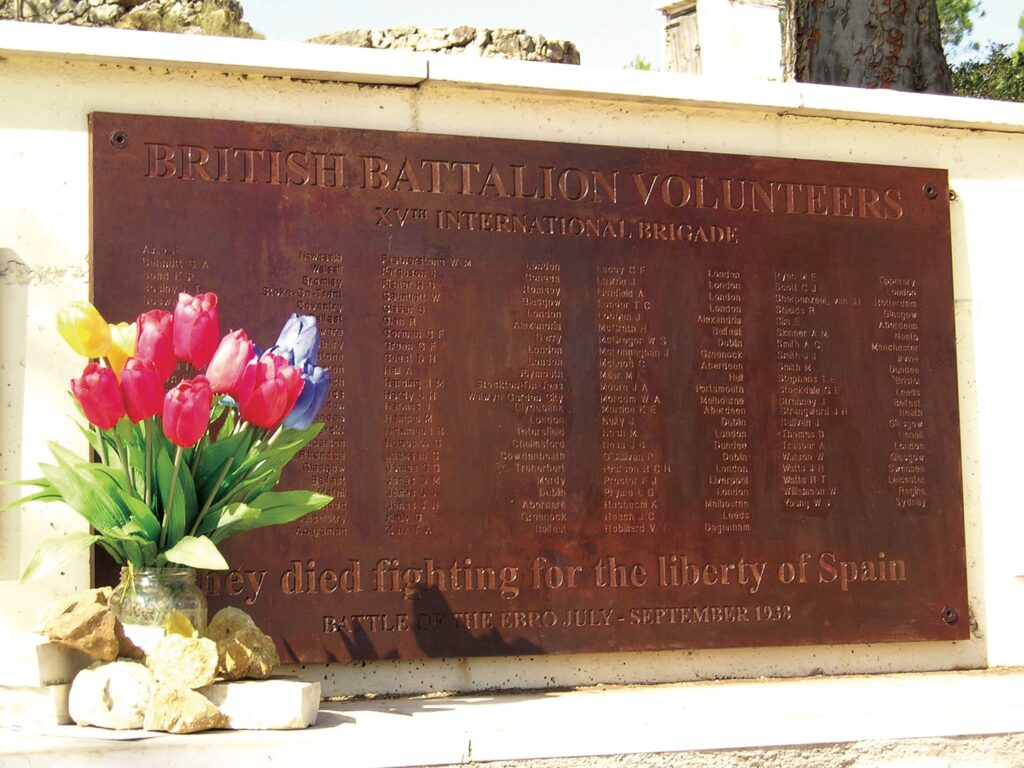International Brigade Memorial Trust
Dolores Long writes…
Two things had a huge effect on me in understanding what the Battle of the Ebro must have been like for the volunteers from 25 July to 23 September 1938. One was going to the area where the fighting took place: the horrendously difficult terrain, huge, high bare mountains with no shade or cover and stifling heat. The other is the recollections of the Brigaders of that tragic last battle; recollections and images that stay in the mind.
Walter Gregory describes: ‘Twelve hours of lying on rocky soil, every fragment intent on burying itself into our bodies, of being continually shot at, of having nothing to eat or drink, of being driven half-mad by the ceaseless attention of the most malevolent flies in the whole of Spain’.
Another person recalled: ‘From the 25 July to the morning of the 30th they had nothing to drink but a little water, sometimes going for a day without this. They are fighting and marching over mountains, the rocks of which have cut their Spanish shoes to pieces. Many are literally barefoot as well as being in rags. Nobody has had a wash since the start of the offensive.’
First aider Alun Menai Williams recalled: ‘It was the worst time in the war. Not for terror, I’d got over that. The agony of the Pandols was that I couldn’t do much for the wounded. Day and night we were being bombarded by aircraft, mortars, shelling and there was no cover. The casualties were horrendous. It was a big, open-air abattoir.’
On 5October the members of the British Battalion bid a painful farewell to their Spanish comrades who were returning to the front to fight. My father, Sam Wild, presented the battalion banners to the Spanish commander, Capt Cipriano. And 200 Republican soldiers formed lines and sang the Republican national anthem as the battalion set off back to the front.

Edwin Greening watched the scene through floods of tears: ‘Finally, the now completely Spanish 35th Division formed ranks and marched to the west, back to the Ebro holocaust, while we foreign volunteers marched in the opposite direction, towards the east.’
Fred Thomas describes how he sat in a lorry with a friend on the way to Barcelona: ‘We sat sombrely, sadness and joyous relief making a hash of our emotions. If either of us wondered what had been achieved since we went over that pontoon bridge on 26July the thought remained unspoken’.
Harry Pollitt described how: ‘Their clothes were torn to shreds; they had a fortnight’s beard. It was difficult to make out who was who.’
Peter Kerrigan, in a letter to Pollitt, wrote: ‘I will never forget when I was told what our causalities were at Jarama. But nothing can compare with the end of our battalion: it was the cutting to pieces of our very bravest.’
Those images of the battle, the Brigaders’ feelings of defeat and the deep sadness of leaving their Spanish comrades to carry on the fight remain in the mind.
On leaving Spain the battalion made the following pledge:
We are returning to our respective countries not for celebrations in our honour, not to rest, but to continue the fight we helped to wage in Spain. The British Battalion is prepared to carry on the work begun here to ensure that our 500 comrades who sleep forever beneath the Spanish soil shall serve as an example to the entire British people in the struggle against Fascism. We intend to keep the promise we made to the Spanish people before we left. We are merely changing the front on which we fight and the weapons that we use.
In differing ways the majority of the volunteers kept that pledge.
I’ll finish with two short poems. A Republican soldier and a Scottish Brigader look past the war with a sense of hope and of optimism.
Miguel Hernández fought in the war, was captured, imprisoned and died of TB in prison. But before he died he had written:
If I die, may I die
with my head held high.
my mouth against the wild grass,
I will have my teeth clenched
and my jaw resolute.
for there are nightingales that sing
above the guns.
Bob Cooney, my father’s lifelong friend, wrote this in the 1960s when Franco was still in power. He looks back to the civil war, but also forward to the day when Franco is gone and he can return to a liberated Spain.
We will stroll in the Puerta del Sol
And the Ramblas of Barcelona
We will cross the Ebro
And drink with our friends in Mora
Friends who’ll be free!
We will look at them
And at each other
And each of us will think
This is why I came in 36…
I went to Spain!
And because of that great yesterday
I am part of the greater tomorrow.
Dolores Long is the daughter of Sam Wild, who commanded the British Battalion at the Battle of the Ebro, and an IBMT Trustee. These words were delivered at an 85th anniversary commemoration at the Marx Memorial Library in London on 22 July.
